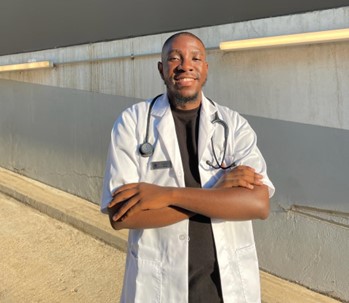Ikaneng Yingwane, student ambassador at Sefako Makgatho Health Sciences, looks back over his experiences with stress and burnout as a medical student - and the importance of recognising the signs early on.
______
As a fourth-year medical student, reflecting on my journey through medical training brings a mix of emotions. I can still vividly recall the excitement of starting medical school. However, that initial enthusiasm soon gave way to long hours of study, sleepless nights, and the mounting pressure to excel. Before I knew it, I found myself overwhelmed and exhausted, signs that I now recognise as burnout.
Burnout isn't just about feeling tired or stressed occasionally; it's a deeper, persistent feeling of emotional, mental, and physical exhaustion. I've experienced feeling constantly tired and drained, even after what I thought was a good night's sleep. I've felt detached or disconnected from patients, colleagues, and even loved ones at times. Struggling to concentrate, make decisions, or complete tasks efficiently became a daily challenge. I also noticed a negative or cynical outlook developing towards my work and patients. On top of that, I experienced headaches and stomach problems that I couldn't explain. Recognising these signs early on was crucial to prevent burnout from affecting my well-being and patient care.
To prevent burnout, I've found several strategies to be helpful. Setting boundaries by learning to say no and setting limits on my workload has been essential. I've also made it a point to schedule regular breaks during study sessions or work shifts to refresh my mind and improve focus. Engaging in activities I enjoy outside of medicine has been a form of self-care that I've come to value. Talking to someone I trust about my feelings, whether it's a friend, family member, or professional counsellor, has also been incredibly beneficial. Lastly, maintaining a healthy lifestyle with proper nutrition, regular exercise, and enough sleep has been key to managing stress and preventing burnout.
Seeking support has been crucial in my journey through medical training. I've learned that I'm not alone in this experience. Seeking support is not a sign of weakness; it's a sign of strength. I've found comfort in talking to peers who have experienced similar feelings, as it provided a sense of understanding and camaraderie. Reaching out to faculty members or mentors I trust has also been helpful, as they've offered guidance, support, and resources tailored to my unique challenges as a medical student. Many medical schools, including mine, offer counselling services tailored to the unique challenges faced by medical students, which I've found to be a valuable resource. Additionally, joining support groups has provided a safe space to share experiences, learn coping strategies, and build connections with others who understand what I'm going through.
Burnout in medical training is a real and prevalent issue that can have serious consequences for medical students and their patients. As a fourth-year medical student, I've learned the importance of identifying signs early, implementing prevention strategies, and seeking support. By doing so, I've been able to better manage stress and prevent burnout, allowing me to continue pursuing my passion for medicine while providing quality care to my patients.

______
To read more student articles like this visit our student hub.